Related Research Articles

Daniel Julius Bernstein is an American mathematician, cryptologist, and computer scientist. He is a visiting professor at CASA at Ruhr University Bochum, as well as a research professor of Computer Science at the University of Illinois at Chicago. Before this, he was a visiting professor in the department of mathematics and computer science at the Eindhoven University of Technology.
Articles related to cryptography include:
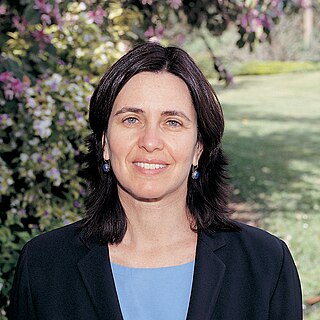
Shafrira Goldwasser is an Israeli-American computer scientist and winner of the Turing Award in 2012. She is the RSA Professor of Electrical Engineering and Computer Science at Massachusetts Institute of Technology; a professor of mathematical sciences at the Weizmann Institute of Science, Israel; the director of the Simons Institute for the Theory of Computing at the University of California, Berkeley; and co-founder and chief scientist of Duality Technologies.
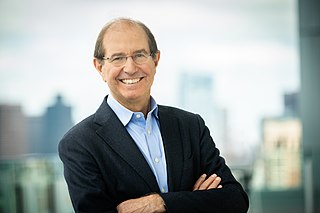
Silvio Micali is an Italian computer scientist, professor at the Massachusetts Institute of Technology and the founder of Algorand, a proof-of-stake blockchain cryptocurrency protocol. Micali's research at the MIT Computer Science and Artificial Intelligence Laboratory centers on cryptography and information security.

Jean-Jacques Quisquater is a Belgian cryptographer and a professor at the University of Louvain (UCLouvain). He received, with Claus P. Schnorr, the RSA Award for Excellence in Mathematics and the ESORICS Outstanding Research Award in 2013.
Victor Saul Miller is an American mathematician as a Principal Computer Scientist in the Computer Science Laboratory of SRI International. He received his B.A. in mathematics from Columbia University in 1968, and his Ph.D. in mathematics from Harvard University in 1975. He was an assistant professor in the Mathematics Department of the University of Massachusetts Boston from 1973 to 1978. In 1978 he joined the IBM 801 project in the Computer Science Department of the Thomas J. Watson Research Center in Yorktown Heights, New York, and moved to the Mathematics Department in 1984. From 1993-2022 he was on the Research Staff of Center for Communications Research (CCR) of the Institute for Defense Analyses in Princeton, New Jersey, U.S. In 2022 he was a Research Scientist in that Statistics and Privacy Group of Meta Platforms.

Arjen Klaas Lenstra is a Dutch mathematician, cryptographer and computational number theorist. He is a professor emeritus from the École Polytechnique Fédérale de Lausanne (EPFL) where he headed of the Laboratory for Cryptologic Algorithms.
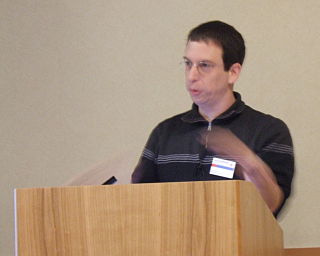
Dan Boneh is an Israeli–American professor in applied cryptography and computer security at Stanford University.
Mihir Bellare is a cryptographer and professor at the University of California San Diego. He holds a Bachelor of Science degree from the California Institute of Technology and a Ph.D. from Massachusetts Institute of Technology. He has published several seminal papers in the field of cryptography, many of which were co-written with Phillip Rogaway. Bellare has published a number of papers in the field of Format-Preserving Encryption. His students include Michel Abdalla, Chanathip Namprempre, Tadayoshi Kohno and Anton Mityagin. Bellare is one of the authors of skein.
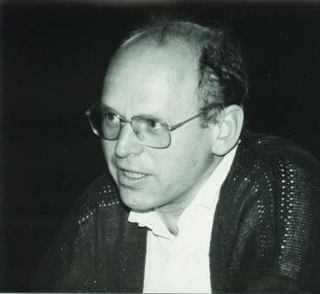
Claus-Peter Schnorr is a German mathematician and cryptographer.

The Encyclopedia of Cryptography and Security is a comprehensive work on Cryptography for both information security professionals and experts in the fields of Computer Science, Applied Mathematics, Engineering, Information Theory, Data Encryption, etc. It consists of 460 articles in alphabetical order and is available electronically and in print. The Encyclopedia has a representative Advisory Board consisting of 18 leading international specialists.

Ueli Maurer is a professor of cryptography at the Swiss Federal Institute of Technology Zurich.
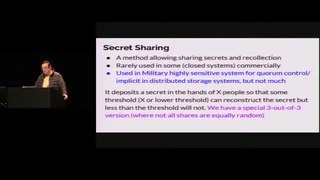
Mordechai M. "Moti" Yung is a cryptographer and computer scientist known for his work on cryptovirology and kleptography.
Lt. Col. Frederick “F.” Lynn McNulty (1939–2012) was the first Director of Information Systems Security for the U.S. State Department, a pioneer in the field of cybersecurity, and has been characterized as the “father” of U.S. federal information security. His peers eulogized him as a tireless advocate for the security of the nation. He was an early and persistent champion of information security in government.

Tal Rabin is a computer scientist and Professor of Computer and Information Science at the University of Pennsylvania. She was previously the head of research at the Algorand Foundation and the head of the cryptography research group at IBM's Thomas J. Watson Research Center.
In cryptography, electromagnetic attacks are side-channel attacks performed by measuring the electromagnetic radiation emitted from a device and performing signal analysis on it. These attacks are a more specific type of what is sometimes referred to as Van Eck phreaking, with the intention to capture encryption keys. Electromagnetic attacks are typically non-invasive and passive, meaning that these attacks are able to be performed by observing the normal functioning of the target device without causing physical damage. However, an attacker may get a better signal with less noise by depackaging the chip and collecting the signal closer to the source. These attacks are successful against cryptographic implementations that perform different operations based on the data currently being processed, such as the square-and-multiply implementation of RSA. Different operations emit different amounts of radiation and an electromagnetic trace of encryption may show the exact operations being performed, allowing an attacker to retrieve full or partial private keys.

The RSA Conference is a series of IT security conferences. Approximately 45,000 people attend one of the conferences each year. It was founded in 1991 as a small cryptography conference. RSA conferences take place in the United States, Europe, Asia, and the United Arab Emirates each year. The conference also hosts educational, professional networking, and awards programs.
Ran Canetti is a professor of Computer Science at Boston University. and the director of the Check Point Institute for Information Security and of the Center for Reliable Information System and Cyber Security. He is also associate editor of the Journal of Cryptology and Information and Computation. His main areas of research span cryptography and information security, with an emphasis on the design, analysis and use of cryptographic protocols.
Caroline Wong is an American chief cybersecurity leader who has worked to advance software security programs and promote the mission, vision, and values D&I in cybersecurity. Throughout her career, Wong has been working to "boost the number of women in the field" and advocate for workplace equality. She regularly speaks at industry events and in publications such as The Washington Post and CBS News, and publishes editorial articles on topics such as DevSecOps alignment, infosec best practices, diversity in cybersecurity, and women in tech.
David Pointcheval is a French cryptographer. He is currently a Senior Researcher at CNRS. He is head of the Computer Science Department and Cryptography Laboratory at the École normale supérieure. He is mainly known for his contributions in the area of provable security, including the Forking lemma, the Pointcheval-Stern signature algorithm, and his contributions to Password-authenticated key agreement.
References
- ↑ "The Cryptographer's Track at RSA Conference (CT-RSA)" . Retrieved 2019-01-24.
- ↑ "RSA Conference Recognizes Axway CSO Dr. Taher Elgamal for Lifetime Achievement in Information Security". Reuters. 2009-04-22. Archived from the original on 2013-11-10. Retrieved 2013-03-20.
- 1 2 "RSA Conference 2010 Honors Information Security and Cryptography Experts with 13th Annual Awards Program (pages 6-7)" (PDF).
- 1 2 "RSA® Conference 2011 Announces Recipients of 14th Annual Awards Program". www.businesswire.com. 2011-02-16. Retrieved 2019-01-16.
- 1 2 3 "RSA® Conference 2012 Announces Recipients of 15th Annual Awards Program". www.businesswire.com. 2012-02-29. Retrieved 2019-01-16.
- ↑ "Ralph Merkle | Computer History Museum". www.computerhistory.org. Retrieved 2019-01-16.
- ↑ "CERTICOM FOUNDER RECEIVES SECURITY AWARD FOR MATHEMATICS FROM RSA". www.certicom.com. Retrieved 2019-01-16.
- ↑ "Don Coppersmith Wins RSA Security Award for Mathematics 2010, IT History". 21 December 2015.
- ↑ "Co-founder of Voltage Security Wins RSA Award". www.SecurityInfoWatch.com. 16 February 2005. Retrieved 2019-01-16.
- ↑ https://wis-wander.weizmann.ac.il/awards-and-appointments/prof-oded-goldreich Oded Goldreich Awards
- ↑ "Ingenico Group - Ingenico's board member Professor Jacques Stern wins the 2007 RSA® Award for Excellence in the Field". www.ingenico.com. 22 February 2007. Archived from the original on July 3, 2022. Retrieved 2019-01-16.
- ↑ "Prof. L. Arjen - RSA Award for excellence in the field of Mathematics". 2008-12-31.
- ↑ "RSA Awards 2009". 22 April 2009.
- 1 2 https://www.youtube.com/watch?v=mCZURH0RBYM Jean-Jacques Quisquater and Claus Schnorr RSA CONFERENCE 2013 ANNOUNCES RECIPIENTS OF 16th ANNUAL AWARDS FOR EXCELLENCE IN MATHETMATICS
- ↑ "Bart Preneel receives excellence in mathematics award". 21 February 2014.
- 1 2 https://www.rsaconference.com/industry-topics/video/2015-excellence-in-the-field-of-mathematics-award RSA Conference 2015 Announces Recipients Of 18th Annual Awards For Excellence In Mathematics
- ↑ "RSA Conference 2016 Announces Recipients of Annual Awards" (Press release). March 2016.
- ↑ "RSA® Conference 2017 Closes with Record Attendance" (Press release). 17 February 2017.
- 1 2 "RSAC 2018 Unveils Recipients of Annual Awards | RSA Conference". www.rsaconference.com. Retrieved 2019-01-16.
- ↑ "RSA Conference 2019 Announces Recipient of Annual Award for Excellence in the Field of Mathematics" (Press release). 5 March 2019.
- ↑ "RSA Conference 2020 Announces Excellence in the Field of Mathematics Award" (Press release). 25 February 2020.
- ↑ "RSA Conference 2021 Announces Recipient of Annual Award for Excellence in the Field of Mathematics".
- ↑ "RSA Conference 2022 Announces Recipient of Annual Award for Excellence in the Field of Mathematics".
- ↑ "RSA Conference 2023 Announces Recipient of Annual Award for Excellence in the Field of Mathematics".
- ↑ "RSA Conference 2024 Announces Annual Awards".
- ↑ https://www.youtube.com/watch?v=I-248cGfwy4 Victor Miller
- ↑ https://www.youtube.com/watch?v=vnX2U2V6OMc Neal Koblitz
- ↑ https://www.youtube.com/watch?v=mCZURH0RBYM Jean-Jacques Quisquater and Claus Schnorr
- ↑ https://www.youtube.com/watch?v=oc9XZd9Hn1s Bart Preneel
- ↑ https://www.youtube.com/watch?v=cl6gCWVr0Q8 Hugo Krawczyk
- ↑ https://www.youtube.com/watch?v=ujDBrNLP8LY Ueli Maurer
- ↑ https://www.rsaconference.com/speakers/tal-rabin Tal Rabin
- ↑ RSA Conference 2020 Excellence in the Field of Mathematics Award. YouTube . Archived from the original on 2021-12-10.
- ↑ Archived at Ghostarchive and the Wayback Machine : RSA Conference 2021 Award for Excellence in the Field of Mathematics. YouTube .
- ↑ https://www.rsaconference.com/library/Video/2023-rsa-conference-math-award
- ↑ https://www.rsaconference.com/library/presentation/usa/2024/rsac%20math%20award%20presentation